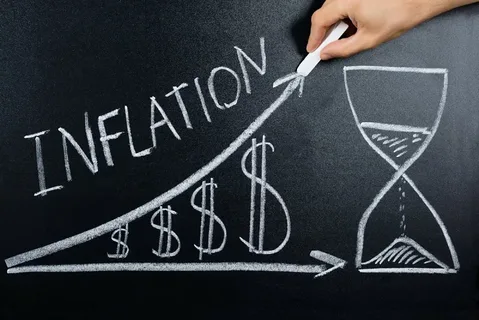How Inflation Affects Your Investments
Many people do not realize that Inflation is a significant concern when it comes to investments. Over the years, it gradually reduces the value of your investments, so investors must learn more about it. An increase in prices lowers your purchasing power, thereby reducing the real return you receive from your investments.
Failing to notice Inflation can be very expensive. A slight increase in Inflation can still erode your savings and plans for the future. Whether you have little experience or are an expert in investing, knowing how inflation works can guide you better.
This article outlines the role that Inflation has on your investment portfolio. Part of this course is understanding asset classes and ways to ensure and increase your wealth as Inflation rises.
- What Is Inflation?
When inflation occurs, the overall prices of goods and services continue to increase over time. If Inflation rises, the same amount of money will cover fewer goods and services. Consumers and investors are affected by the fall in purchasing power in different manners.

The inflation rate is typically measured using economic indicators, such as the Consumer Price Index (CPI) and the Producer Price Index (PPI). They monitor the changes in the average price of a certain set of goods over a period. While some inflation is good for the economy, high Inflation usually creates worries.
Inflation can occur when production costs rise, demand exceeds supply, or when monetary policies are implemented. For this reason, it’s necessary to understand how Inflation can impact future investments.
- The Erosion of Purchasing Power
Purchasing power decreases gradually every time inflation occurs. Purchases typically rise in value by 10% when Inflation is running at that level, so what costs $100 at the moment could cost $110 a year later. Such losses may have significant effects on savings and investments in bonds.
If Inflation is higher than any gains you get from your investments, then you have negative real returns. In this case, you may not even realize that you are losing money. Gaining returns higher or equal to the rate of Inflation is necessary to protect your wealth if you are an investor.
Retirement plans might fail if Inflation is not factored into the investments made. Consequently, adding inflation-protecting assets to your portfolio matters a lot, especially when high inflation is occurring.
- Impact on Fixed-Income Investments
Inflation is a bigger threat to bonds and certificates of deposit than to other types of investments. The interest payments on these programs are predetermined and don’t adjust with Inflation.
As Inflation grows, the actual profit you get from fixed-income assets is generally less. Assuming Inflation rises to 3%, a bond that pays 4% annually could only deliver a real return of 1%. During Inflation, the fact that investment projects generate less profit may make them less appealing.
Inflation may cause investors to shift from holding fixed securities and opt for instruments that benefit from Inflation increases, as well as those offering varying returns.
- Inflation and Stocks
It’s normal for stocks to triumph over Inflation in the long run, though not always. Inflation may cause sudden fluctuations and disorder in the stock market shortly.
When companies experience increased production and labor costs, they may earn less money, and their stock prices could drop. But, when businesses have strong pricing power, they can keep profits by increasing the prices they charge to buyers.
When Inflation is high, investors usually pick the energy, utility, and consumer staples sectors. Most of these industries stay strong since their products and services are always sought after.
- Real Estate as a Hedge
Real estate is known to stand as a useful protection against Inflation. Because property prices and rental income usually go higher with Inflation, they can shield you from the effects of Inflation.
Owning properties gives individuals the promise of steady returns and appreciation in value. If Inflation rises, landlords may raise rents to cover the increase in their expenses and continue to generate an income.

At the same time, real estate has its inherent risks, such as fluctuations in interest rates and regular maintenance costs. Even so, when part of an overall portfolio, it can withstand inflation well.
- Commodities and Inflation
When inflation occurs, oil, gold, and agricultural products are often viewed as safe investment options. Prices typically rise when demand increases, and the value of the currency decreases.
People often turn to gold when there is uncertainty in the economy or when Inflation happens. Even though gold does not earn income, its worth might climb when Inflation rises, and shares and other assets lose their value.
Anyone looking to invest in commodities will need to understand how global demand for them fluctuates and what factors drive these changes. These assets have the potential to generate profits, although their values can fluctuate rapidly, and you should handle them with care and thorough knowledge.
- Treasury Inflation-Protected Securities (TIPS)
TIEPs are government bonds designed to protect individuals from Inflation. This allows them to maintain your returns alongside the increases in the cost of living due to Inflation.
Additionally, TIPS interest is adjusted for Inflation, allowing conservative investors seeking a stable income to hedge some of their earnings against inflation in this way. Most notably, they are safe in periods when Inflation shoots up and is hard to predict.
TIPS can be a key component of a well-diversified bond portfolio. Although their yields are not as high as those of other types of bonds, these investments can still yield good inflation-adjusted returns.
- Cash and Inflation
It is usually unsafe to keep large cash amounts when there is Inflation. Cash does not produce any income, and its worth goes down when Inflation kicks in. The money you keep in savings could buy you less tomorrow than it does now.
Many investors set aside some money to cover unexpected expenses. Although it makes sense, extra money should be invested into things that keep up with Inflation. As a result, the lost opportunity can add up significantly in the coming years.
Even though money market funds or high-yield savings accounts often give you more interest than keeping your money in your bank account, they usually do not meet Inflation.
- Dealing with Inflation when saving for retirement
For a person living on a fixed income, retirement becomes risky if there is Inflation. Throughout a long retirement, Inflation that is not too high can quickly reduce how much people spend and thus reduce their quality of life.
When planning for retirement, consider the impact of inflation on prices. Housing, health expenses, and daily costs are some of the things that will increase over time.
People in retirement can explore assets and methods that increase their income to offset Inflation, such as stocks that pay dividends, annuities that adjust accordingly, or real estate investments.
- Diversification Helps You Protect Your Portfolio
Using a variety of assets is one of the best ways to control the risks caused by Inflation. A variety of investments in a portfolio makes sure you are not very exposed to any asset class that can be affected by Inflation.
If you hold various assets, such as stocks, bonds, real estate, commodities, and inflation-linked bonds, you can protect your portfolio from the effects of Inflation. It reduces overall risks and enables the potential for greater returns in the long run.
With diversification, companies can adjust to different situations. When the economy is inflating, adjust your portfolio to include more assets that perform well during such periods and stay on track with your goals.
- Using Investments on a Global Scale as Protection
The value of foreign assets allows for protection from Inflation at home. The rate of Inflation varies from one place to another, which is why having investments in various spots can help protect your total holdings.
During periods of Inflation, emerging markets are likely to grow at a higher pace. Many of these nations usually have industry sectors and resources that thrive as prices increase.
Still, there are additional risks associated with international investments, including currency fluctuations, political events, and varying regulations in each country. One should do their homework or seek a financial advisor’s opinion before investing in global markets.
- How Important is the Role of Central Banks
It is the main responsibility of central banks to control Inflation. Through interest rates and open-market transactions, they regulate the supply of money and influence the economy.
If inflation rises too quickly, central banks typically raise interest rates to slow the rate at which money is spent and borrowed. It has a significant impact on the returns of interest-related assets, such as bonds and real estate.
When investors are aware of important central bank decisions, they can be prepared for any market changes and adjust their strategies accordingly. Understanding how investments are affected by monetary policy plays a significant role in creating a robust portfolio.
- Protecting your Investments
Inflationary periods call for investors to use different methods to defend their wealth. When Inflation is expected, put your funds first into assets that typically perform better, such as real estate, various commodities, and TIPS.
The second point is to look for value stocks instead of growth stocks. Companies that have solid, unchanging dividends usually deal with Inflation better than those focused mainly on growth.
Additionally, keep a close eye on your portfolio by checking it regularly. Timely rebalancing is important because Inflation can change fast and keep your portfolio on track with what you want to achieve.
Conclusion
Since Inflation usually can’t be prevented, you can still manage its effect on your portfolio. Make sure you act by learning about the impact and employing assets that shield you from Inflation.
Making your portfolio varied, being informed, and changing your strategy as needed will help your finances in the future. If you are ready for it, Inflation can provide chances to make good investments.
If you choose wisely now, your money will continue to do well even when the economy sees rapid Inflation. Be attentive, spread out your investments, and keep your money active enough to keep pace with the rising cost of living.



